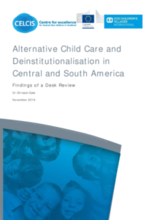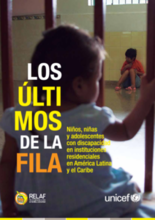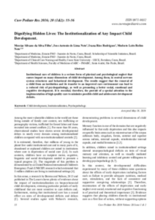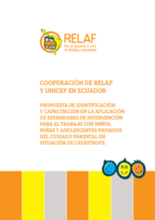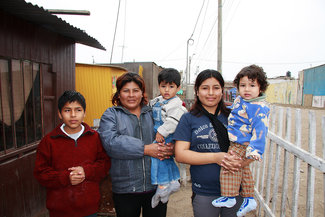

Displaying 241 - 250 of 346
The overall purpose of this study is to present an ‘introduction’ to alternative care systems in Central and South America (CSA).
This country care review includes the care-related Concluding Observations adopted by the Committee on the Rights of Persons with Disabilities during the sixteenth session (15 Aug 2016 – 2 Sep 2016) of the Convention on the Rights of Persons with Disabilities.
Este informe, presenta los resultados de ese estudio, examina las condiciones en que se encuentran los niños y los adolescentes con discapacidad en relación con el ejercicio de sus derechos, y propone algunas líneas de acción estratégica para mejorar las políticas y las prácticas en dirección a la garantía y la restitución del derecho de todos los niños, las niñas y los adolescentes a crecer en un ámbito familiar y comunitario, y sin discriminación.
The aim of the present paper is to systematically review the empirical studies that have analyzed the associations between poverty and cognitive development in children under 18 years of age from Latin American and Caribbean countries between 2000 and 2015.
The results of this study suggest that the removal of a child from an institution and its transfer to an improved care environment can lead to a reduced risk of psychopathology, as well as promoting a better social, emotional and cognitive development.
The video ‘Last Minute Orphanage’ offers an unique insight into the world of volunteering. It tells the story of 3 volunteers who travel to Cuzco Peru to volunteer for a few weeks with children.
El presente documento de protección está destinado a guiar las acciones de las instituciones gubernamentales y no gubernamentales de Ecuador, en su respuesta humanitaria para la protección de los derechos de los niños, niñas y adolescentes ecuatorianos y sus familias, afectadas por el terremoto ocurrido en fecha 16 de Abril del 2016.
The purpose of this study was to determine the factors associated with the risk of negligence in child care during the first year of rearing in adolescent and adult mothers.
El objetivo de este estudio fue determinar los factores asociados al riesgo de negligencia en el cuidado del hijo durante el primer año de crianza en madres adolescentes y adultas.
On 19 April 2016, Fundación Munasim Kullakita (a member of RISE´s Latin American Regional Working Group) will be hosting a webinar to discuss how they are implementing the care model ECO2 with children affected by sexual exploitation in Bolivia.

